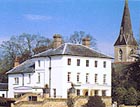Rising Interest Rates, Rising House Prices
The Bank of England raised interest rates to five percent today, but new data from Halifax and Savills suggests the increase will do nothing to stop property prices climbing for the rest of 2006.


Exquisite houses, the beauty of Nature, and how to get the most from your life, straight to your inbox.
You are now subscribed
Your newsletter sign-up was successful
Interest rates now stand at 5% - their highest point since August 2001 - after the Bank of England announced a quarter percent increase. Meanwhile new data from Halifax shows house prices increased for a third consecutive month in October, and are likely to rise further in November and December. The latest Halifax House Price Report recorded price rises of 1.7% in October, following a strong increase of 1.2% in September. The annual growth rate now stands at 8.6% and with increasing levels of employment and a strong UK economy, property economists predict prices will keep rising for the rest of the year ? despite today interest rate announcement. The new Halifax figures are in line with other monthly housing market reports. August?s interest rate rise did nothing to cool the market and for the last few months new buyer enquiries and transactions have been increasingly steadily. ?Given the current strength of market momentum, annual house price growth on the Halifax index is likely to move higher in the last two months of 2006,? commented property economist Kelvin Davidson. Rising interest rates are, according to Mr Davidson, all that could put a dampener on the current house price inflation. ?With affordability already on a deteriorating trend, we think that a further rate rise from the MPC at lunchtime (today) and an additional one in the New Year will have a more marked impact on activity and price pressures.? But Yolande Barnes, Director of Savills? Research does not think a rise in interest rates will do the trick: ?Unlike many commentators, we do not expect that a quarter of a percentage point rise would have a significant effect on the housing market,? she said. ?We think that interest rates would have to rise to around 6.5% before house price growth would start to slow.? Savills? analysis has shown that the surplus available for luxury spending, and additional spending on housing, is still high, creating a ?comfort cushion? which will stop the market from falling. ?In the absence of broader economic failure, the worst that the housing market will see under our scenario is a situation more similar to that seen in 1979 rather than 1989,? Ms Barnes explained, ?That is, low levels of turnover with little or no price growth (rather than falls) in the market as a whole and isolated falls in oversupplied and low-demand markets.?
Exquisite houses, the beauty of Nature, and how to get the most from your life, straight to your inbox.
Country Life is unlike any other magazine: the only glossy weekly on the newsstand and the only magazine that has been guest-edited by His Majesty The King not once, but twice. It is a celebration of modern rural life and all its diverse joys and pleasures — that was first published in Queen Victoria's Diamond Jubilee year. Our eclectic mixture of witty and informative content — from the most up-to-date property news and commentary and a coveted glimpse inside some of the UK's best houses and gardens, to gardening, the arts and interior design, written by experts in their field — still cannot be found in print or online, anywhere else.

